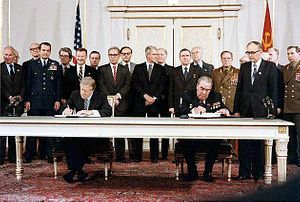The enthusiasm, or lack thereof, which radiated from Chinese Premier Xi Xinping as he shook hands with Japanese Prime Minister Shinzo Abe at last month’s APEC summit in Beijing was surely one of this year’s highlights of the annual meeting. Frostiness aside, it was an important moment that marked a turn in China-Japan relations that in recent years have been anything but warm. The reversal has been such that more and more the term détente, usually reserved to describe the U.S.-Soviet relations during the 1970s, has been used to describe the current state of relations between Beijing and Tokyo, including in a recent editorial in the New York Times written by Akio Takahara, Japanese Secretary General of the Japan-China Committee. What exactly does détente mean in the context of complex Sino-Japanese relations?
Although in the West the term may be synonymous with the thawing of icy relations between any two great powers, the understanding of détente in China goes further, retaining a distinctly Soviet framing. Despite the fact that Sovietology is seen as an increasingly irrelevant field of study in the West 25 years after the end of the Cold War, it remains popular amongst the Chinese leadership, who vividly remember the USSR and have developed what some call an obsession over studying what led to the demise of their former rival. As an example, one need not look further than a film produced last year in China about the fall of the Soviet Union, which had among its intended lessons to “correctly understand the lessons of history.” The Soviet specter being a haunting presence for Chinese policymakers has implications as Tokyo and Beijing retreat from brinksmanship.
David Holloway, the noted political scientist, recently commented that the Soviet challenge to Washington is one of the primary comparison points used in Beijing to assess the future of their relationship with the United States. For China, détente between the Soviet Union and the United States was less of a voluntary reduction of tensions between the two superpowers as it was a stalemate in which the Americans found themselves in a post-Vietnam reality that forced them to accommodate a USSR that was continuing to close the gap between itself and the West. Washington never abandoned its agenda of sidelining the Soviets, but rather put it on hold – resuming it when Soviet stagnation became the beginning of a slow decline and the stalemate was broken.
This interpretation of détente is relevant for the current China-Japan thaw. Xi and his inner circle may view last month’s shift not as stemming from the realities of economic interdependence and skillful diplomacy but from a Japanese realization that accommodations are needed for a rapidly growing China. Last month’s agreements are certainly broad enough that they can be interpreted as concessions, at least as far as the Senkaku/Diaoyu Islands dispute is concerned. Were this the case, the current period of détente represents something of a temporary truce rather than the groundwork for lasting cordiality. The continuing rise of China could then be accompanied with an abandonment of détente once Beijing has determined that it has sufficiently eclipsed Japan.
Further limiting the prospects for a durable cooperative relationship is Chinese nationalism. Japanese nationalism, while also a potentially destabilizing force, is restrained by significant pushback from sectors of society that resist a departure from the country’s postwar pacifism. No equivalent counterbalance exists in China, where Japan’s past aggression provides a seemingly endless supply of ammunition to nationalists that continue to see their neighbor as an enemy and an unrepentant nation. It is no surprise that the Communist Party, which bases its legitimacy on nationalism and its ability to produce high economic growth, turned to the former when results on the latter began to be increasingly harder to deliver.
Although business interests, significantly impacted by the capital flight that resulted from the tense environment, were able to exert some influence towards easing the recent hostilities, the fact remains that the underlying issues at the heart of this troubled relationship are largely unchanged. When the next crisis invariably surfaces, the Chinese leadership, be it in the hands of Xi or a future successor, will need to balance the nationalist undercurrents permeating in Chinese society and the Party with the reality that the benefits of a peaceful relationship with Japan far outweigh those of belligerence.
Much like the U.S.-Soviet détente, the current thaw cannot be expected to last as long as fundamental differences have not been addressed. That said, in an interconnected Asia, a Sino-Japanese détente has the potential to be one characterized by shared prosperity, marking a sharp contrast with the U.S.-Soviet version, which was characterized by shared stagnation.
Miguel Oropeza De Cortéz-Caballero is a Berkeley graduate and San Francisco based Asia Consultant with expertise in both East and Central Asia, where he has studied and worked.
































